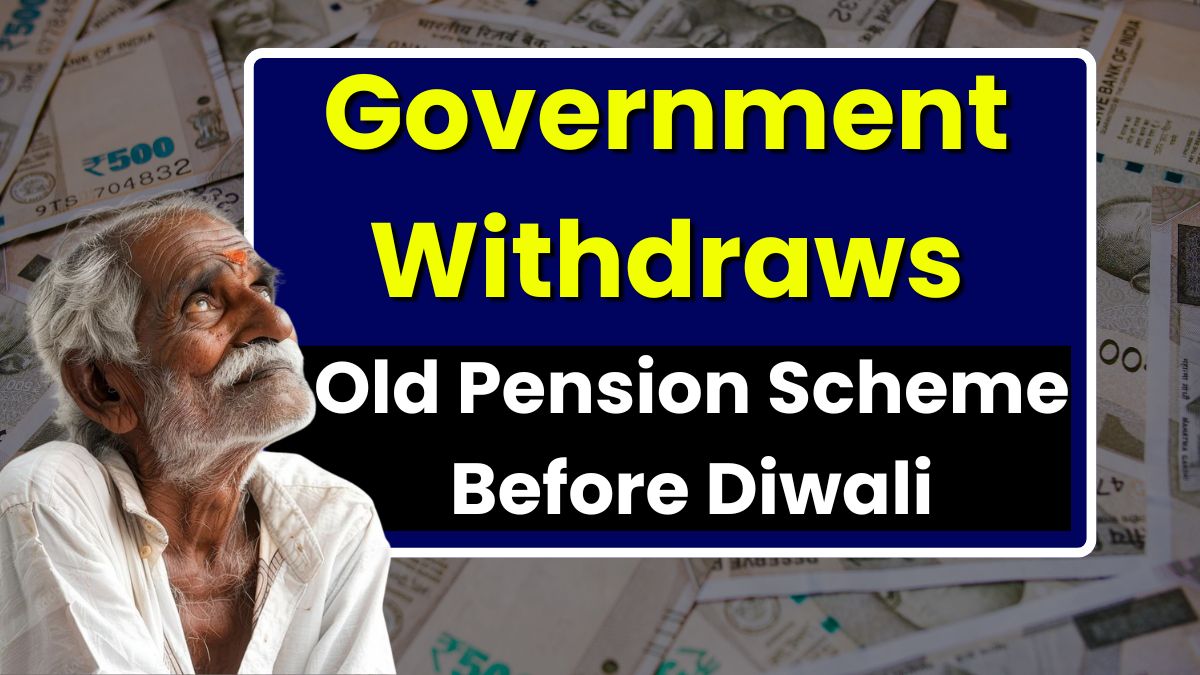Just when government employees in Rajasthan were expecting some festive cheer before Diwali, an unexpected decision from the Bhajanlal Sharma-led government has left many disappointed. The state has officially rolled back the Old Pension Scheme (OPS) that was brought back by the previous Congress government — a move that could affect thousands of employees across the state.
Now, why is this decision such a big deal? Let’s break it down simply.
What Just Happened?
The Rajasthan government has announced that it will withdraw the Old Pension Scheme (OPS) that was reinstated during the Ashok Gehlot-led Congress regime.
This rollback means employees working in state boards, corporations, universities, autonomous bodies, and state-owned enterprises will no longer get pension benefits under OPS.
Instead, the state is reopening the door for National Pension System (NPS), Contributory Provident Fund (CPF), and Employees Provident Fund (EPF) — schemes that rely more on individual savings and market-linked returns rather than a guaranteed pension.
So, in simple terms — the guaranteed lifetime pension promised under OPS will now be replaced with contribution-based systems again.
Why Did the Government Take This Step?
According to the Finance Department, the main reason behind this decision is financial stress.
In an official order, the department mentioned that several boards, corporations, and universities were struggling to meet pension obligations under OPS due to their weak financial position.
Hence, these institutions have been allowed to opt out of OPS and continue with NPS or similar schemes.
The department also clarified that if any institution is not able to sustain the pension burden, it should:
- Decide not to implement OPS.
- Refund the employer’s contribution deposited in the PD (Personal Deposit) account.
- Add applicable interest before returning the money to the concerned employees or pensioners.
A Look Back: When OPS Was Reintroduced
Under the previous Congress government, the Old Pension Scheme was reintroduced in April 2023.
A notification dated April 20, 2023, announced the GPF-Linked Pension Scheme (another name for OPS).
It was seen as a pro-employee move — ensuring assured lifetime pension after retirement, which many workers prefer over the market-dependent NPS.
However, not all government institutions implemented OPS immediately. Some were waiting for financial clearance, while others faced internal delays.
Then came the Finance Department’s June 6, 2025 order, which directed institutions not to return the OPS funds if they had already decided to implement it.
Now, with the latest order, the state government has effectively reversed that decision, citing financial feasibility.
What Does This Mean for Employees?
For employees working in boards, corporations, and autonomous bodies, this decision feels like a step backward.
Many had already opted for OPS, hoping for a secure and predictable pension after years of service. Now, they will likely move back under NPS, CPF, or EPF, where pension amounts depend on market performance and individual savings, not government guarantees.
Employees’ unions have already started voicing concerns, calling the move “a betrayal just before Diwali”. For many, this decision doesn’t just affect their finances — it shakes their long-term security.
Government’s Clarification
The Finance Department’s latest guideline makes one thing clear:
If an institution cannot financially support OPS, it must refund all the money deposited under that scheme — including employer contributions and accrued interest — to the employees or pensioners.
After doing so, those institutions must reimplement the previous pension systems (like NPS, CPF, or EPF) to ensure continuity.
In short, OPS is now optional, and only financially strong institutions can afford to keep it running.
What’s Next?
The big question now is — will this decision stay?
Employee groups are already planning representations and protests, demanding that OPS be restored.
For the state government, the challenge lies in balancing fiscal responsibility with employee welfare, especially ahead of the festive season.
And for employees, it’s another reminder that pension security in India remains a moving target, influenced by both economic realities and political changes.
Frequently Asked Questions
Q1. What is the Old Pension Scheme (OPS)?
The Old Pension Scheme (OPS) is a government-backed retirement plan that provides employees with a fixed, guaranteed pension after retirement, unlike NPS, which depends on market returns.
Q2. Why did the Rajasthan government roll back OPS?
The state cited financial difficulties, stating that many boards and corporations couldn’t afford the long-term pension burden under OPS. Hence, they’re being allowed to continue under NPS, CPF, or EPF.
Q3. Will employees get their OPS contributions back?
Yes. The Finance Department has directed that if OPS isn’t implemented, the entire amount in the PD account — including employer contributions and interest — must be refunded to employees or pensioners.



